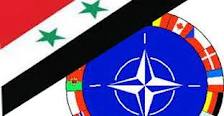The Arab League: Paving the Way for a US-NATO-Israel War with Syria and Iran

A military move against Syria could also imply intent to attack Iran, just when the Western states want to dispel the fears that the Iranians, Russians and Chinese have of such an attack.
The Arab League’s decision to suspend Syria’s membership, impose economic sanctions and discuss transition-period arrangements with the opposition, could pave the way to a military offensive on Syria, similar to the one on Libya.
However, it’s doubtful whether Western states – who have so far used the lack of Arab support for intervention to justify their inaction – will take advantage of this. That’s because, unlike the attack on Libya, an offensive against Syria could have dramatic regional repercussions.
Iran could decide to open its own front and Hezbollah – as leader Sheikh Hassan Nasrallah threatened last week – could launch an attack on Israel. A military move against Syria could also imply intent to attack Iran, just when the Western states want to dispel the fears that the Iranians, Russians and Chinese have of such an attack.
This is not the first time the Arab League has suspended a member state. It suspended Egypt’s membership for 10 years after it signed the peace agreement with Israel, and suspended Libya’s membership. But the decision against Syria is not merely a penal measure. In addition to delegitimizing President Bashar Assad’s regime, it grants Arab legitimization to the large, albeit not exclusive, opposition faction – the National Syrian Council, established in Istanbul. The council has been recognized for the first time as the official representative of the Syrian people.
By so doing, the Arab League is assuming the role of “regime maker,” which acts rather than merely responds. Its move is likely to lead Russia to meet with the opposition representatives for the first time as well. If such a meeting takes place, it will mark a dramatic turning point in Russia’s position; until now it has sided with Assad.
Iraq has so far refrained from supporting the League’s decision, but did not oppose it as Lebanon and Yemen did. Iraq, which coordinates its foreign policy with Iran, voted in a manner reflecting Iran’s distress.
Iran, which is not a league member, is still sticking to its support of Assad. But in recent weeks Iranian leadership officials have been calling to stop the brutal oppression in Syria.
Opposition officials in Syria reported that Iranian officials have met Syrian opposition members to discuss “the future.” As far as Iran is concerned, “the future” will oblige it to examine its own relations with the opposition, to make sure the Arab League’s decision does not leave it bereft of Syrian allies.
Hence the importance of the league’s decision, which poses a strategic dilemma both to the West and to Iran.

